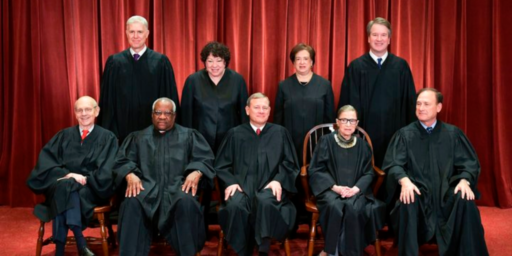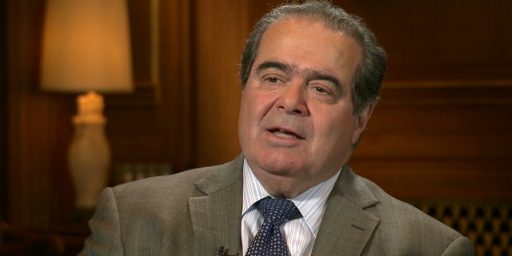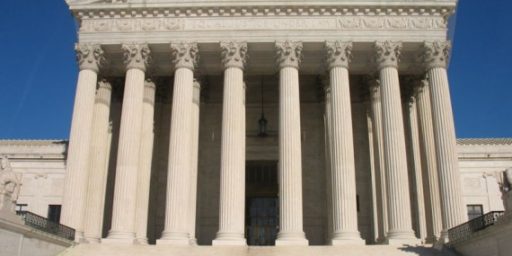Clarence Thomas: The Last Originalist
Randy Barnett argues in an NRO piece that this week’s decision in Reich (the medical marijauna case) establishes that “there are not two principled originalist justices on the Court today, but one.” While conservative icon Antonin Scalia strained to write a concurring opinion supporting federal authority over drugs grown and used entirely within one state border, Clarence Thomas was the only Justice willing to stand up for the Framers’ Constitution.
Ann Althouse points us to an October 2004 WaPo interview with Scalia that adds fuel to that fire:
Scalia told Foskett that Thomas “doesn’t believe in stare decisis, period.” Clarifying his remark, Scalia added that “if a constitutional line of authority is wrong, he would say let’s get it right. I wouldn’t do that.”
Stare decisis is a fancy Latin term that stands for a bedrock proposition of U.S. law: that the Supreme Court will uphold precedent and not disturb settled law without special justification. As Justice Thurgood Marshall explained for the court in 1986, stare decisis is the “means by which we ensure that the law will not merely change erratically, but will develop in a principled and intelligible fashion.”
Steven Taylor takes the middle ground: “Justices ought not seek to reverse prior Court decisions for personal ideological reasons, there are times when a prior Court has made a mistake.” I tend to agree, although am probably somewhat closer to Thomas than Scalia on this matter.
Settled law is not necessarily good law. To take the most hackneyed example, Plessy v. Ferguson‘s “separate but equal” ruling stood from 1896 until at least 1950 (Sweatt v. Painter) and arguably 1954 (Brown v. BOE). That made its judicial provenance older than those of the 1960s school prayer decisions (Engel v. Vitale (1962) onward) or the privacy rights created in 1965 and extended with Roe in 1973 are to the modern court. At what point does stare decisis become binding?
To take a silly example, I’ve always thought Marbury v. Madison (1803) was wrongly decided. Not even Clarence Thomas, however, would contend that we ought undo judicial review.
How about more recent decisions? While I approve of the public policy outcomes of the Engel and company, they certainly don’t square with the Framers’ vision. Are those decisions now sacrosanct? They appear to be. The cases that have come up in the last twenty-odd years have been on the margins of the Establishment Clause.
Almost no one thinks that Roe was well reasoned, even if they agree with the Constitutional outcome. It seems to be one of the very few landmark decisions, though, that is potentially in play depending on the future compositon of the High Court.
Update (1319): Charles Krauthammer has a superb column in today’s WaPo (A23) on this point.
[…] The real question is never what judges decide but how they decide it. The Scalia-Thomas argument was not about concern for cancer patients, the utility of medical marijuana or the latitude individuals should have regarding what they ingest. It was about what the Constitution’s commerce clause permits and, even more abstractly, who decides what the commerce clause permits. To simplify only slightly, Antonin Scalia says: Supreme Court precedent. Clarence Thomas says: the Founders, as best we can interpret their original intent.
The Scalia opinion (concurring with the majority opinion) appeals to dozens of precedents over the past 70 years under which the commerce clause was vastly expanded to allow the federal government to regulate what had, by the time of the New Deal, become a highly industrialized country with a highly nationalized economy. Thomas’s dissent refuses to bow to such 20th-century innovations. While Scalia’s opinion is studded with precedents, Thomas pulls out founding-era dictionaries (plus Madison’s notes from the Constitutional Convention, the Federalist Papers and the ratification debates) to understand what the word commerce meant then. And it meant only “trade or exchange” (as distinct from manufacture) and not, as we use the term today, economic activity in general. By this understanding, the federal government had no business whatsoever regulating privately and medicinally grown marijuana.
This is constitutional “originalism” in pure form. Its attractiveness is that it imposes discipline on the courts. It gives them a clear and empirically verifiable understanding of constitutional text — a finite boundary beyond which even judges with airs must not go. And if conditions change and parts of the originalist Constitution become obsolete, amend it. Democratically. We have added 17 amendments since the Bill of Rights. Amending is not a job for judges.
The position represented by Scalia’s argument in this case is less “conservative.” It recognizes that decades of precedent (which might have, at first, taken constitutional liberties) become so ingrained in the life of the country, and so accepted as part of the understanding of the modern Constitution, that it is simply too revolutionary, too legally and societally disruptive, to return to an original understanding long abandoned.
And there is yet another view. With Thomas’s originalism at one end of the spectrum and Scalia’s originalism tempered by precedent — rolling originalism, as it were — in the middle, there is a third notion, championed most explicitly by Justice Stephen Breyer, that the Constitution is a living document and that the role of the court is to interpret and reinterpret it continually in the light of new ideas and new norms.
This is what our debate about judges should be about. Instead, it constantly degenerates into arguments about results.
Quite right. Indeed, I made that point, mess less eloquently, in my original blog post on the ruling: “The understanding of the press corps, let alone much of Congress, that the court is not in the business of deciding things like whether sick people should get marijuana is astounding.”






“…this week’s decision in Reich…”
Ah, but was it the third decision? :>
Here, in my unsophisticated p.o.v., is the problem with originalism in this context:
Smart, educated judges don’t always agree on what the “original” meaning was.
So, in 2007, Chief Justice Thomas writes for the Court to uphold the “original” meaning of the Commerce Clause. And in 2013, Chief Justice Clinton (Thomas having died of a stroke when Hillary won the White House) writes for the Court to uphold a different take on the “original” meaning of the CC. Since we’ve torn up stare decisis, hey, no problem! The CC can change “original” meanings as often as the Court majority shifts!
It is nice if the law is right, but sometimes it’s more important that it be predictable. Businesses, for example, need to know what the law on various subjects is, so that they can plan and act accordingly. Without stare decisis, there’s a lot less confidence that the law will stay like it is. It can be a lot easier to work around a bad (interpretation of a) law than to shift gears every few years as to what the law is.
Anderson,
That’s why their are 9 of them and why the majority rules. As CK says, if conditions change and we disagree with the supremes we can amend.
Keep in mind that this is supposed to be a democratic republic and not a judicial oligarchy.
That’s why their are 9 of them and why the majority rules. As CK says, if conditions change and we disagree with the supremes we can amend.
I’m not sure how “why the majority rules” answers the problem about different interpretations, or how the ability to amend (very difficult in practice) solves anything, since amendments have to be interpreted (and Scalia, at least, will have no truck with legislative history).